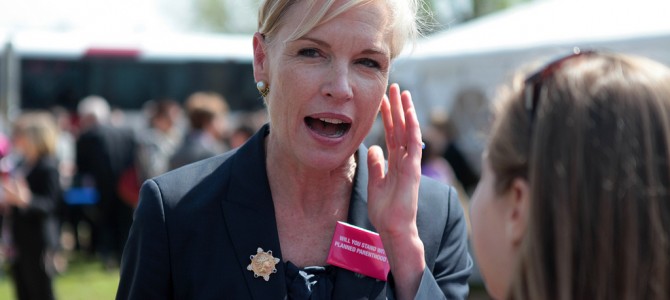
Cecile Richards has announced she is stepping down as CEO of Planned Parenthood after more than a decade as the recognizable face of the abortion giant. The amount of pain women have experienced under her directive, not to mention the 3 million unborn babies aborted, is severe, to put it mildly.
But there is another dimension to the abortion industry rarely discussed: The women who work in abortion clinics but who no longer want to be there. And Then There Were None is a non-profit organization that exists just for these women, and some of their stories are as horrifying as they are hopeful.
Though she wasn’t exactly a banner-waving, pro-choice zealot, Annette Lancaster worked for nine months in 2015 at a Planned Parenthood in Chapel Hill, North Carolina, for the same reason a lot of women do: she needed a job.
“Many women get trapped working there. They need money. Many women are single moms,” she told me while standing in a huddle with other former abortion clinic workers who have sought hope and healing at And Then There Were None.
Though she hadn’t decided if she was pro-life or pro-choice when she first started working there, it didn’t take long for Lancaster to realize she was helping abort unborn babies, and she wanted no part in it. “After I was there for a few months I realized that was not what I wanted to do. I started to become a dark person full or dark humor, often depressed. It was a dark environment.”
As the clinic manager, Lancaster did everything, including watch abortions and assist with abortion procedures. “I had to help pick through fetal body parts,” she said. “When I did, it clicked, This is a baby. What the h-ll am I doing?”
The culture at the Planned Parenthood that employed Lancaster was as caustic and unprofessional as it was gory and ghoulish. She said it wasn’t uncommon for colleagues to mock a patient anxiously awaiting abortion. “Physicians often talked badly about patients while performing procedures on them,” Lancaster recalls. “Sometimes physicians would not use the proper amount of sedation. They would tell the patient they were providing them with certain medications, but they were out, so the patient didn’t get it.”
Just when Lancaster reached her limit, she found pieces of literature And Then There None left on her car, specifically directed at her because she was working at Planned Parenthood. The organization helped her leave the clinic and slowly begin to heal.
An eight-year veteran of Planned Parenthood, Abby Johnson, founded And Then There Were None, because she believed strongly in the need for women who have worked in abortion clinics to receive a tailored kind of help. Her organization is pro-life, without exceptions, but believes the lives of the women who work in the clinics are valuable too.
“As former clinic workers, we have a different perspective than others may have — we’ve been in their shoes,” the organization states. “And we used those shoes to walk away.”
And Then There None reaches out to women working in Planned Parenthood abortion clinics through discreet literature drops they refer to as “in-reach” campaigns. They send or place literature or postcards that don’t look like the typical pro-life pieces that typically get thrown out. Megan Weber, the Client and Development Manager at the organization, says every time they do a targeted mailing they will hear back from 7-10 employees of an abortion clinic who need support.
“We know no one grows up wanting to work there,” she told me. “No little girl says, ‘I want to work in an abortion clinic.’ Where the abortion industry is, that’s where desperate people are – -the workers and the patients. Abortion workers are the most misunderstood group of people among pro-life people, because many abortion workers are pro-life and even Christians.”
The women who leave the abortion industry often feel ostracized, depressed and ashamed. To aid in this, And Then There Were None hosts healing retreats designed to address the wounds of working in a clinic. They utilize a retreat center in Texas, offered by generous donors, and Weber purchases airline tickets for the women attending — meals are also provided.
“It’s camaraderie and healing to come together to have a safe place where there is no judgement of what happened,” Weber says.
And Then There Were None has helped nearly 400 abortion workers leave the industry to date. Slowly but steadily, they are helping women who once helped abort babies find their tribe outside the walls of a place that hurt them, perhaps as much as they hurt others while they worked there.
Who knows, now that Cecile Richards is leaving Planned Parenthood, she may spur an exodus of employees confused and in pain over abortions they helped facilitate. And Then There Were None will be there to help them, as Weber says, “find their tribe and find healing.”









